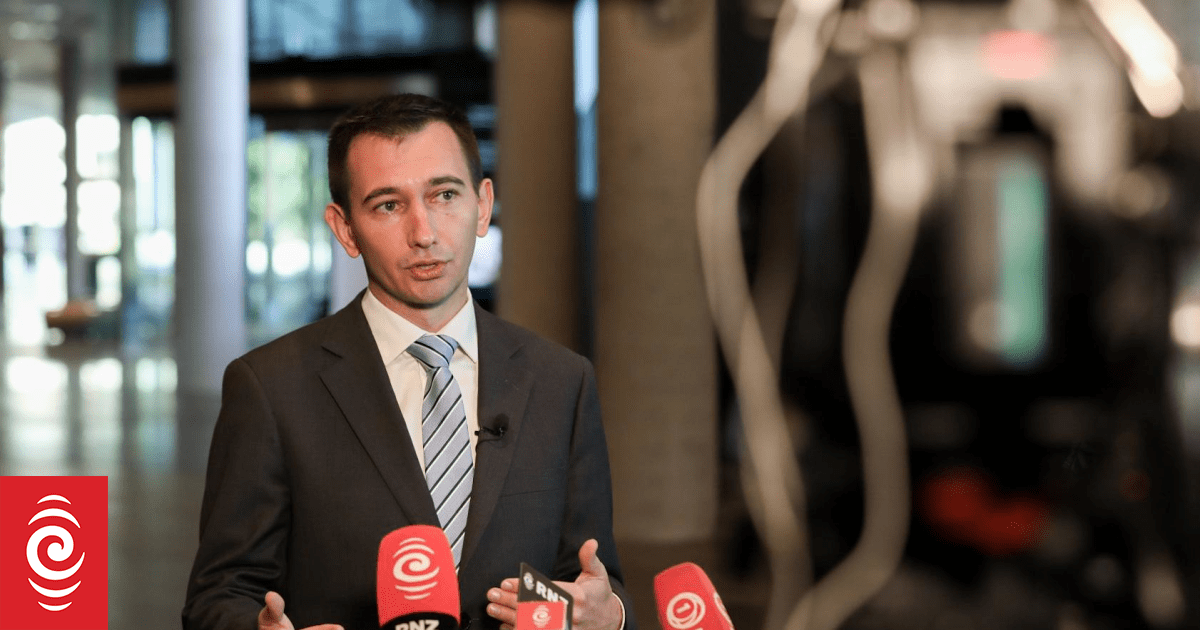“Health professionals absolutely retain the right to raise concerns about patient safety and care,” says Health Minister Simeon Brown.
Photo: Nathan Mckinnon / RNZ
Doctors say proposed law change would prevent them advocating for patients
They say lives are at risk
Government says it’s making existing obligations clear, but health workers retain the right to speak out for patient safety
Doctors have made impassioned pleas to the government to step back from a law change they say will gag them from speaking out and cost patient lives.
Health Minister Simeon Brown insisted the overhaul of the Healthy Futures Act, which lays out what the health system is supposed to deliver, would not restrict workers from raising safety concerns.
The Act simply made “clearer” the existing requirement for Health NZ staff to maintain political neutrality, he said, but key doctor groups are not convinced.
Consultant physician Marion Leighton said recent history had seen many scandals where people had died, because healthworkers were silenced.
“To suggest that healthcare workers should only support the government of the day has been shown to cost lives,” she told a health select committee hearing submissions on the Bill.
She cited the example of Stafford Hospital in England, where needless deaths occurred amid appallingly substandard care, after millions of pounds were cut from front-line services.
“Hundreds of people died, because healthcare staff were prevented from speaking up in a politically neutral way, ie. to support healthcare and the safety of their patients, rather than in support of the government of the day – which is actually what this ‘political neutrality’ is trying to say.”
Clause 11A is a new section in the Healthy Futures (Pae Ora) Amendment Bill, requiring Health NZ “employees, board members, the chief executive, contractors and secondees” to be “politically neutral”, without defining what that means.
Dr Leighton said a government would want healthcare workers to uphold public service obligations of political neutrality for only one reason – to stop them from speaking out.
“It will silence your healthcare workers from speaking on behalf of you and your families, when you need them to speak out,” she told MPs.
“Don’t do this. It’s short-sighted, it’s authoritarian and it’s a really silly thing to do, if you want the best healthcare system you can have in this country.”
Submissions from several medical colleges singled out Clause 11 as dangerously problematic.
College of Obstetricians and Gynaecologists spokesperson Dr Sue Fleming said doctors would end up in conflict with their professional ethics.
“When a gynaecologist identifies that a cervical-screening programme is failing Māori women in their district, speaking up becomes a choice between professional ethics and employment law.”
Doctors should not have to choose between keeping their jobs and keeping patients safe, she said.
The College of Psychiatrists submission outlined the lessons from Lake Alice, where children and young people were drugged and tortured with electric shocks, sexual abuse and beatings – allowed, in large part, by systemic silencing of whistleblowers.
Whaea Moe Milne, who was involved in the Royal Commission into those historic horrors, said the mental health system was still failing some people, particularly Māori.
“The way our people were treated in mental health services has been described as torture… but actually they still exist today for some of our people, who traverse mental health services.”
College of General Practitioners president Dr Luke Bradford said the proposed law change could also have a chilling effect on GPs, who were government funded.
“We have to avoid echo chambers. We have to accept that people’s health and wellbeing should not be part of the political seachange – it’s a basic human right.
“We invest money in training experts to look after it – we should be able to trust we can hear from those experts.”
Labour-led governments had also been guilty of trying to silence doctors’ criticism in the past, he said.
Bill clarifies ‘existing obligations’ – Minister
Health Minister Simeon Brown told RNZ the obligations of political neutrality already applied to every public servant under the Public Service Act.
“The bill before parliament does not introduce new restrictions,” he said. “It simply makes these existing obligations clearer for Health New Zealand employees.
“Importantly, health professionals absolutely retain the right to raise concerns about patient safety and care.
“Speaking out on critical clinical issues is a longstanding part of employment agreements and codes of good faith, which this bill does not change.”
The Healthy Futures (Pae Ora) Amendment Bill has the stated goal of improving health service delivery.
Key changes include shifting Health New Zealand’s focus towards infrastructure, increasing national oversight, enshrining government health targets and to remove requirements for the health system to deliver equitable outcomes for Māori.
The bill passed its first reading and is currently before the Health Committee for public submissions, with a report due in late November.
Sign up for Ngā Pitopito Kōrero, a daily newsletter curated by our editors and delivered straight to your inbox every weekday.

